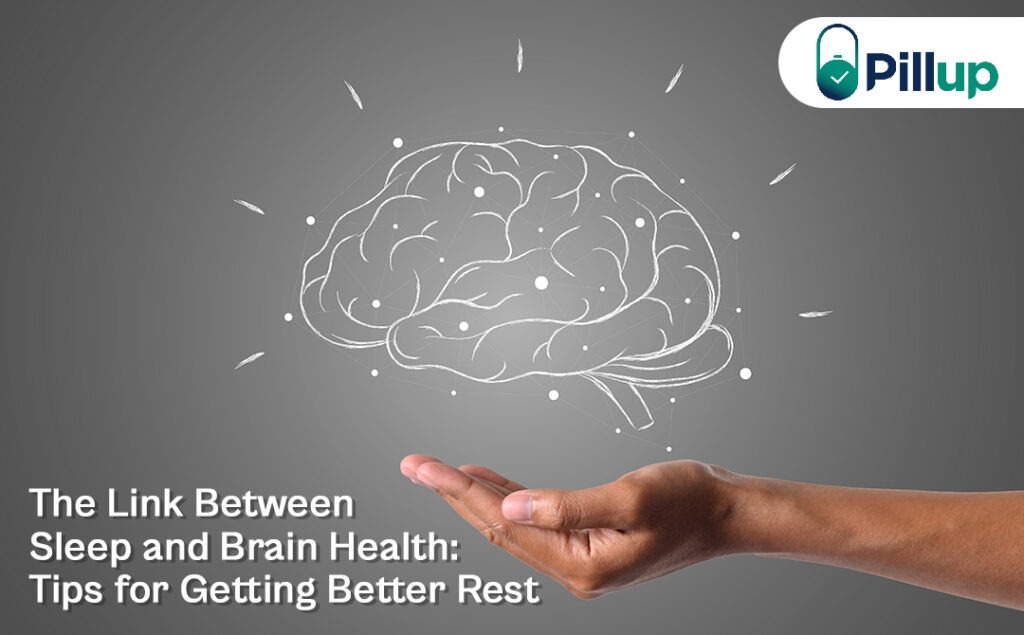Imagine life as an intricate dance, with sleep as the choreographer orchestrating our every move. The importance of sleep for our overall health is undeniable, and yet, it’s often an overlooked aspect of our daily routines. From physical well-being to mental acuity, sleep plays a pivotal role in ensuring we stay on our toes.
The connection between sleep and brain health is particularly fascinating. Sleep is like the brain’s personal concierge, tending to its every need while we’re blissfully unaware. Restorative sleep is crucial for cognitive function, memory consolidation, and emotional stability.
In this article, we’ll unravel the mysteries of sleep and its relationship with brain health. We’ll explore the science behind this magical elixir, delve into common sleep disorders, and share valuable tips for getting a better night’s rest. So, snuggle up and prepare for an enlightening journey through the world of sleep and its impact on your gray matter.
The Science Behind Sleep and Brain Health
Picture yourself entering a grand ballroom where the Sleep Symphony is about to begin. As the music commences, the sleep stages unfold like a beautifully choreographed dance.
Our sleep is composed of various stages, each with its unique purpose. The dance begins with light sleep (NREM Stage 1 and 2), followed by deep sleep (NREM Stage 3) – the show’s star, where our bodies and minds rejuvenate. Finally, we’ve whisked away into the dreamy world of REM sleep, where our minds wander, and memories are crafted.
But what happens when the Sleep Symphony is interrupted, and sleep deprivation sneaks in like an uninvited guest? The cognitive performance takes a hit as if the dancers have suddenly forgotten their steps. We may experience brain fog, impaired decision-making, and difficulties with concentration.
Sleep Disorders and Their Impact on Brain Health
In the world of sleep, there are some unwelcome guests that can disrupt the harmony of our nightly dance. These sleep disorders are notorious for causing chaos in the brain’s performance.
Insomnia
Insomnia, the troublemaker of the bunch, keeps us awake with its racing thoughts and restlessness. It robs us of precious slumber, leaving us groggy and unable to think clearly.
Sleep Apnea
Sleep apnea, on the other hand, interrupts our breathing patterns, causing a series of micro-awakenings that leave us feeling exhausted. Our cognitive abilities suffer as our brain struggles to keep up with the disrupted rhythms.
Restless Legs Syndrome
Restless legs syndrome, like an annoying itch, compels us to move our legs constantly, breaking the flow of our sleep. The inability to fully relax and drift off results in reduced focus and concentration during the day.
Narcolepsy
Narcolepsy plays a cruel trick on us, causing sudden and uncontrollable bouts of sleepiness, making it hard to stay awake and alert when we need to be.
These sleep disorders are more than just nuisances; they can wreak havoc on our brain health. That’s why it’s crucial to seek professional help when we notice these unwelcome guests crashing our sleep party. With the right guidance and intervention, we can restore harmony to our nightly dance and ensure our brains continue to thrive.
Tips for Improving Sleep Hygiene
To ensure our Sleep Symphony remains harmonious, we must take a proactive approach by practicing good sleep hygiene. Think of it as a pre-show ritual that prepares our bodies and minds for the enchanting performance to come.
Establishing a consistent sleep schedule
First, establish a consistent sleep schedule, making sure to rise and retire at the same time each day. This helps our internal clock stay in sync, allowing the Sleep Symphony to begin on cue.
Establishing a consistent sleep schedule
Next, create a sleep-friendly environment, transforming our bedrooms into cozy sanctuaries. Invest in comfortable bedding, moderate the temperature, and eliminate noise and light distractions. This sets the stage for a peaceful and restorative slumber.
Limiting exposure to screens before bedtime
Limit exposure to screens before bedtime, as the blue light emitted from devices, can disrupt our body’s production of melatonin, the sleep-inducing hormone. Consider swapping screens for a book or engaging in calming activities to unwind.
Managing stress and anxiety
Managing stress and anxiety is vital, as these can interfere with our sleep dance. Find healthy outlets for stress, such as exercise, journaling, or talking to a trusted friend. This allows our minds to be more at ease when it’s time to rest.
Incorporating relaxation techniques
Lastly, incorporate relaxation techniques into our nightly routines. Deep breathing, progressive muscle relaxation, or meditation can help quiet the mind and soothe the body, inviting sleep to gracefully sweep us off our feet.
By following these sleep hygiene tips, we can enhance the quality of our nightly dance and ensure our brains remain sharp and agile for years to come.
The Role of Diet and Exercise in Sleep Quality
Just like a well-choreographed dance, our sleep quality is influenced by various factors, including diet and exercise. These elements play a vital role in keeping our nightly performance in perfect harmony.
Impact of caffeine, alcohol, and nicotine on Sleep
Caffeine, alcohol, and nicotine can be the unruly dancers that disrupt our sleep. Consuming them too close to bedtime may lead to restless tossing and turning or even prevent us from dozing off altogether. It’s best to limit these substances, especially in the evening.
Importance of balanced and nutritious meals
The importance of balanced and nutritious meals cannot be overstated. Consuming diverse vitamins in a diet rich in fruits, vegetables, whole grains, and lean proteins helps support the body’s natural rhythms, including sleep. Just like an orchestra, our bodies need the right fuel to perform at their best.
Also Read: What are the benefits of vitamins for health?
Timing of meals and snacks
The timing of meals and snacks is equally crucial. Eating a heavy meal too close to bedtime can cause discomfort and interfere with our sleep. Opt for lighter, easily digestible options in the evening and avoid late-night snacking.
Regular physical activity and its effects on sleep
Regular physical activity plays a starring role in our Sleep Symphony. Not only does it help reduce stress and anxiety, but it also promotes deeper and more restorative sleep. Engaging in daily exercise, even in the form of a gentle walk or yoga, can work wonders for our sleep quality.
By paying attention to our diet and exercise routines, we can support our bodies in performing the nightly dance of sleep, ensuring a restful and rejuvenating slumber that bolsters our brain health.
Conclusion
As the curtain falls on our exploration of the sleep and brain health connection, let’s take a moment to recap the invaluable role that quality sleep plays in supporting cognitive well-being, memory consolidation, and learning.
Prioritizing sleep is an essential act of self-care, one that keeps our minds sharp and agile. By implementing the tips shared in this article and seeking professional help when faced with sleep disorders, we can orchestrate a better night’s rest and contribute to a healthier brain.
In our pursuit of improved health, PillUp’s pre-sorted medication services can be a valuable ally. By ensuring timely and accurate medication intake, Pillup helps eliminate the stress and confusion often associated with managing multiple prescriptions.
Let’s work together to harmonize our sleep routines and overall wellness. With PillUp’s support, you can set the stage for better brain health and enjoy the countless benefits that come with a good night’s sleep



